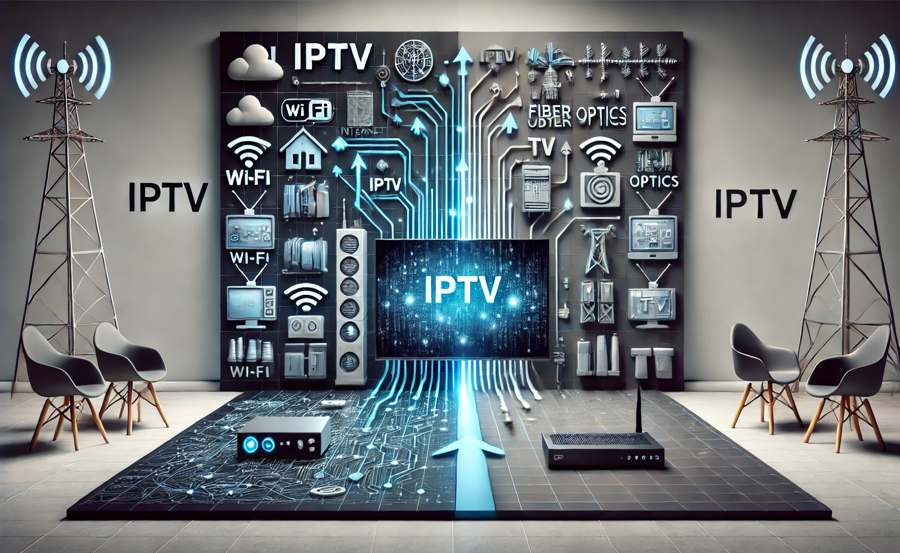IPTV vs. Traditional Cable and Satellite TV: Key Differences
The way we consume television has drastically changed over the years, with IPTV (Internet Protocol Television) emerging as a flexible alternative to traditional cable and satellite TV. While traditional methods rely on physical infrastructure like cables and satellites, IPTV delivers content through the internet. Understanding the key differences between these technologies can help you decide which option best suits your needs.
This guide compares IPTV, cable TV, and satellite TV in terms of delivery, cost, content, and user experience.
What is IPTV?
IPTV delivers television programming and video-on-demand content via the internet. Instead of relying on traditional broadcasting methods, IPTV uses internet protocols to stream content directly to devices like smart TVs, smartphones, tablets, and computers.
What is Cable and Satellite TV?
- Cable TV:
- Uses coaxial or fiber-optic cables to deliver television signals to households.
- Satellite TV:
- Broadcasts signals from satellites to a satellite dish installed at the user’s location.
Key Differences Between IPTV, Cable, and Satellite TV
| Feature | IPTV | Cable TV | Satellite TV |
|---|---|---|---|
| Delivery Method | Over the internet | Coaxial or fiber-optic cables | Satellite signals via dish |
| Content Availability | Live TV, VOD, time-shifted content | Live TV | Live TV |
| Device Compatibility | Smart TVs, smartphones, tablets, PCs | Traditional TVs | Traditional TVs |
| Setup Requirements | Internet connection, IPTV player | Cable box, subscription | Satellite dish, receiver |
| Cost | Affordable, customizable | Higher monthly fees | Equipment costs + monthly fees |
| Streaming Quality | HD and 4K (depends on internet speed) | HD and SD | HD and SD |
| Interactivity | High (EPG, time-shift, VOD, catch-up TV) | Limited | Limited |
| Weather Impact | None | None | Signal loss in bad weather |
| Availability | Global (with internet access) | Regional | Global, but signal-dependent |
Advantages of IPTV Over Cable and Satellite TV
1. Flexible Content Delivery
- IPTV allows you to watch live TV, on-demand movies, and catch-up TV anytime.
- Cable and satellite TV often follow fixed schedules with limited on-demand options.
2. Multi-Device Compatibility
- IPTV can be accessed on smart TVs, phones, tablets, and PCs.
- Cable and satellite TV require dedicated setups, like a set-top box or satellite receiver.
3. Cost-Effective
- IPTV often costs less than traditional services, especially when subscribing to custom plans.
- Cable and satellite subscriptions usually involve higher monthly fees.
4. High-Quality Streaming
- IPTV supports HD and 4K streaming, provided you have a fast internet connection.
- Satellite and cable TV may lag in offering consistent high-quality resolution.
5. Interactivity
- IPTV offers advanced features like:
- EPG (Electronic Program Guide): View program schedules.
- Catch-Up TV: Replay previously aired shows.
- Time-Shift TV: Pause, rewind, or fast-forward live TV.
- Traditional TV lacks these interactive options.
Advantages of Cable and Satellite TV Over IPTV
1. Reliable Service
- Cable and satellite TV don’t rely on internet connectivity, making them less prone to interruptions caused by bandwidth issues.
2. Better for Rural Areas
- Satellite TV is accessible in remote locations where high-speed internet isn’t available.
- IPTV requires a stable internet connection, which may not be feasible in rural areas.
3. Live Sports and Premium Channels
- Cable and satellite TV providers often have exclusive deals for live sports and premium channels.
Challenges of IPTV
- Internet Dependency:
- IPTV requires a stable internet connection, with speeds of at least 10 Mbps for HD streaming.
- Buffering Issues:
- Slow or unstable internet can lead to buffering during playback.
- Content Legality:
- Some IPTV services may stream unauthorized or unlicensed content.
- Device Compatibility:
- Not all smart TVs or devices support IPTV apps.
Challenges of Cable and Satellite TV
- Higher Costs:
- Monthly fees, equipment rentals, and premium channel add-ons can make traditional services expensive.
- Limited Flexibility:
- Fixed schedules and lack of on-demand options restrict viewing flexibility.
- Weather Sensitivity:
- Satellite TV signals can be disrupted by bad weather, leading to service interruptions.
When to Choose IPTV
- You Want Flexibility:
- Stream on multiple devices and watch content on-demand.
- You Have a Reliable Internet Connection:
- IPTV thrives on stable, high-speed internet.
- You Want Cost Savings:
- IPTV subscriptions are typically more affordable.
When to Choose Cable or Satellite TV
- You Live in a Rural Area:
- Satellite TV is better for locations with limited internet access.
- You Prioritize Reliability:
- Cable and satellite TV offer more consistent service in areas with unstable internet.
- You Want Premium Sports Packages:
- Traditional providers often have exclusive sports deals.
Future of IPTV vs. Traditional TV
As internet infrastructure improves globally, IPTV is becoming the preferred choice for many viewers due to its flexibility, affordability, and interactive features. Cable and satellite TV will continue to serve users in areas with limited internet access, but their popularity is expected to decline over time.
Conclusion
IPTV offers a modern, flexible, and cost-effective way to enjoy television, while cable and satellite TV provide reliability and broader access in areas with limited internet availability. By understanding the differences in delivery methods, costs, and features, you can choose the option that best fits your entertainment needs. With IPTV leading the future of television, it’s an exciting time to explore its possibilities.
Amazon Fire TV and IPTV: Endless Entertainment


